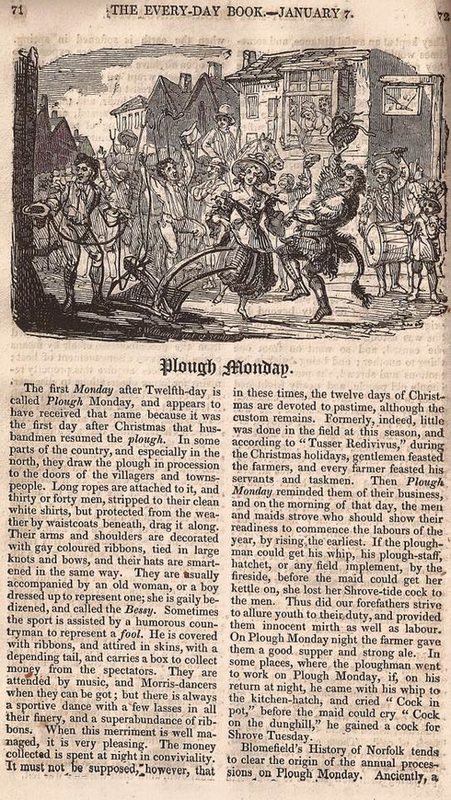HISTORY OF PLOUGH MONDAY
Plough Monday is a very ancient custom, whose earliest history lies in the 16th century although it may well have roots originating from religion well before then. Documents tell of a "plough candle" being lit in churches during January in the 13th century.
Plough Monday is traditionally the first Monday after Epiphany (January 6th or "twelfth night" as it is also known). Its celebration seems to have covered much of the Eastern half of the country, particularly in small rural villages.
Towns and larger villages often had their own town plough which was kept by the church but the reformation signalled an end to the church's direct interest in this, although some villages still insisted on celebrating Plough Sunday when the plough was drawn into the church to be blessed before being taken round the village on the Monday.
Not much appears to have been written about the custom up until a report in a Cambridge newspaper in 1816 which stated "Plough Monday is still observed at Cambridge by people going about the town pulling a plough with blackened faces, decorated with ribbons, and even one man dressed in women's clothing".
From 1840 to about 1900, the Cambridge newspapers were guaranteed to report something on Plough Monday, whether it was in the city itself or in the villages. By this time it had got a reputation for being a bit rough and their antics often ended up with an appearance in court.
In Balsham, Plough Monday marked the beginning of the winter ploughing season when the farm workers returned to work from their short but unpaid Christmas holiday (or lay off). For these men who had no money, it was an ideal opportunity to collect both food and money. They would call on the village squire, farmers, shopkeepers and their "better off" fellow villagers, in fact anywhere they could reasonably expect a donation. If they were refused anything, as would sometimes happen, they would threaten to plough a furrow across their nice neat lawn. This threat was only occasionally carried out.
Plough Monday is traditionally the first Monday after Epiphany (January 6th or "twelfth night" as it is also known). Its celebration seems to have covered much of the Eastern half of the country, particularly in small rural villages.
Towns and larger villages often had their own town plough which was kept by the church but the reformation signalled an end to the church's direct interest in this, although some villages still insisted on celebrating Plough Sunday when the plough was drawn into the church to be blessed before being taken round the village on the Monday.
Not much appears to have been written about the custom up until a report in a Cambridge newspaper in 1816 which stated "Plough Monday is still observed at Cambridge by people going about the town pulling a plough with blackened faces, decorated with ribbons, and even one man dressed in women's clothing".
From 1840 to about 1900, the Cambridge newspapers were guaranteed to report something on Plough Monday, whether it was in the city itself or in the villages. By this time it had got a reputation for being a bit rough and their antics often ended up with an appearance in court.
In Balsham, Plough Monday marked the beginning of the winter ploughing season when the farm workers returned to work from their short but unpaid Christmas holiday (or lay off). For these men who had no money, it was an ideal opportunity to collect both food and money. They would call on the village squire, farmers, shopkeepers and their "better off" fellow villagers, in fact anywhere they could reasonably expect a donation. If they were refused anything, as would sometimes happen, they would threaten to plough a furrow across their nice neat lawn. This threat was only occasionally carried out.

